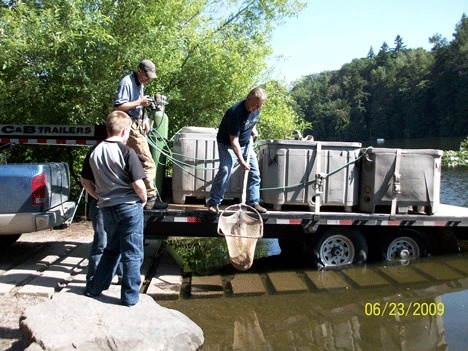Kent city officials stocked Lake Fenwick with 300 grass carp on Tuesday in a new effort to combat Brazilian elodea, a noxious weed that threatens to overtake the lake.
“We hope that the fish will be able to eradicate the non-native invasive plant Brazilian elodea from the lake’s bottom leaving it healthier, improving water quality and fish habitat,” said Matt Knox, a city environmental ecologist, in an e-mail Wednesday.
The 12-inch carp were ordered from Opaline Aqua Farm LLC out of Melba, Idaho at a cost of $4,500. The city received a grant from the state Department of Ecology to pay for the carp.
The carp can grow as long as 4 feet and weigh as much as 40 pounds.
Knox emphasized that it is illegal to remove the carp from the lake because the fish are there to remove weeds. If anyone sees an angler taking carp, they can call the state Department of Fish and Wildlife enforcement number at 360-902-2926.
Over the last few years at Lake Fenwick, swimmers have become entangled in the aggressive weed. The weed also forms dense beds that reduces water quality. The weed could also spread to other lakes if a small piece gets stuck on a boat prop that later enters a different waterway, Knox said.
Lake Fenwick is the highlight of the 140-acre park located just south of Reith Road at the base of the West Hill. The lake is fairly shallow and reaches 28 feet at the deepest point in the middle.
Brazilian elodea covers about 15 acres of the 23-acre lake. Brazilian elodea used to be a common decorative plant for home aquariums in the 1980s and 1990s. It is now illegal to sell the plant in Washington because of its ability to infest lakes.
A person probably dumped goldfish from an aquarium in the lake and that’s how the weed got established, Knox said. He compared the aggressiveness of the weed in the water to how blackberry bushes grow on land.
Grass carp are the only fish that eat the weed. The city decided to try carp rather than a herbicide or bottom barrier materials to keep the plants from growing.
It will take a couple of years of carp eating the weed to notice any difference. Knox said he hopes the weed will be gone in about five years.
Talk to us
Please share your story tips by emailing editor@kentreporter.com.
To share your opinion for publication, submit a letter through our website https://www.kentreporter.com/submit-letter/. Include your name, address and daytime phone number. (We’ll only publish your name and hometown.) Please keep letters to 300 words or less.

